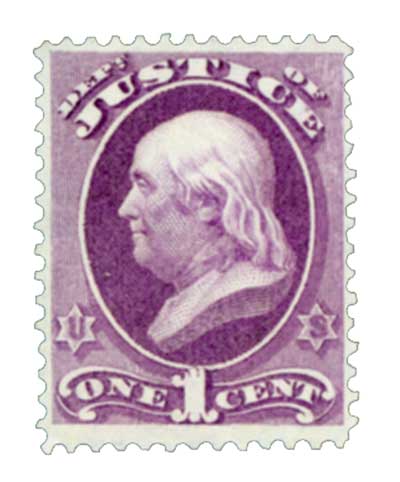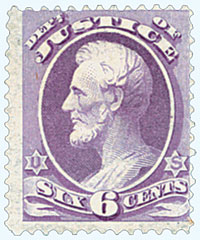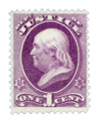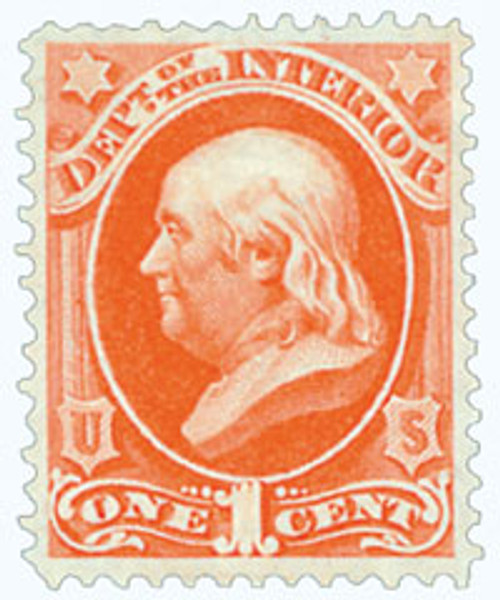
# O25 - 1873 1c Purple, Department of Justice, Franklin, Hard Paper
1873 1¢ Franklin
Official Stamp – Justice
Department Of Justice Established

On June 22, 1870, President Ulysses S. Grant signed a bill into law creating the U.S. Department of Justice.
The position of Attorney General was created through the Judiciary Act of 1789 as a part-time job to advise the President and Congress on legal matters. Officially, it was the Attorney General’s job “to prosecute and conduct all suits in the Supreme Court in which the United States shall be concerned, and to give his advice and opinion upon questions of law when required by the President of the United States, or when requested by the heads of any of the departments.”

By 1819, the workload had grown significantly and the jobs of the Attorney General and his assistants were restricted. However, many early Attorney Generals did not receive the same rate of pay as other members of the President’s cabinet, so most of also appeared in court to supplement their income.
As early as 1830 there were calls to make the Attorney General’s office a full-time position. Then, in 1867, Congressman William Lawrence of the House Committee on the Judiciary suggested a law department run by the Attorney General that included department solicitors and U.S. attorneys. The following year, on February 19, 1868, Lawrence brought a bill before Congress to create the Department of Justice. However, he was preoccupied with the impeachment of President Andrew Johnson and was unable to devote his time to the bill.
1873 1¢ Franklin
Official Stamp – Justice
Department Of Justice Established

On June 22, 1870, President Ulysses S. Grant signed a bill into law creating the U.S. Department of Justice.
The position of Attorney General was created through the Judiciary Act of 1789 as a part-time job to advise the President and Congress on legal matters. Officially, it was the Attorney General’s job “to prosecute and conduct all suits in the Supreme Court in which the United States shall be concerned, and to give his advice and opinion upon questions of law when required by the President of the United States, or when requested by the heads of any of the departments.”

By 1819, the workload had grown significantly and the jobs of the Attorney General and his assistants were restricted. However, many early Attorney Generals did not receive the same rate of pay as other members of the President’s cabinet, so most of also appeared in court to supplement their income.
As early as 1830 there were calls to make the Attorney General’s office a full-time position. Then, in 1867, Congressman William Lawrence of the House Committee on the Judiciary suggested a law department run by the Attorney General that included department solicitors and U.S. attorneys. The following year, on February 19, 1868, Lawrence brought a bill before Congress to create the Department of Justice. However, he was preoccupied with the impeachment of President Andrew Johnson and was unable to devote his time to the bill.













